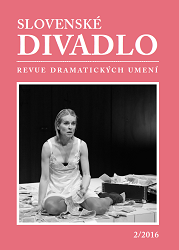NAŠI NAŠI FURIANTI PETRA LÉBLA
NAŠI NAŠI FURIANTI BY PETR LÉBL
Author(s): Vít PokornýSubject(s): Anthropology, Theatre, Dance, Performing Arts, Customs / Folklore, Czech Literature, Sociology of Culture, Drama, Sociology of Art
Published by: SAV - Slovenská akadémia vied - Ústav divadelnej a filmovej vedy SAV
Keywords: postmodernismus; naturalismus; Petr Lébl; Ladislav Stroupežnický; národ; mytologie; demytizace;
Summary/Abstract: This study draws on a doctoral thesis dealing with a series of postmodern productions of a Czech naturalist rural drama, which were put on the stage at the turn of the twentieth and twenty-first centuries. In 1994 Petr Lébl, a prominent Czech postmodern director, undertook the direction of Ladislav Stroupežnický’s classic Czech realist drama Naši furianti [Our Swagerrers] from 1887. A distinct feature of Lébl’s directorial work is visual opulence. Also in this case, he packed the small stage of the Divadlo Na zábradlí theatre with dozens of actors and a large number of props, mixing elements of Czech, Spanish, Jewish and other national folklores in a pell-mell manner. In order to point out how devoid of any real substance national symbols are, he presented his characters in the style of Czech fairy tales – the just shoemaker Habršperk as a devil, the deceitful tailor Fiala as a water goblin and the brave army veteran Bláha as the Knight of Blaník. In addition, the role of the village teacher was performed by a black person, and a blind person played the part of a village scribe and law expert. Lébl thus took an ironic stance towards the tradition of realist staging of Stroupežnický’s drama by the National Theatre and indirectly commented on the chaos in values that had set in after the fall of the communist totalitarian rule in 1989 and with the onset of market economy practices, unrestrained by moral considerations, in Czech society.
Journal: Slovenské divadlo
- Issue Year: 64/2016
- Issue No: 02
- Page Range: 147-164
- Page Count: 18
- Language: Slovak

